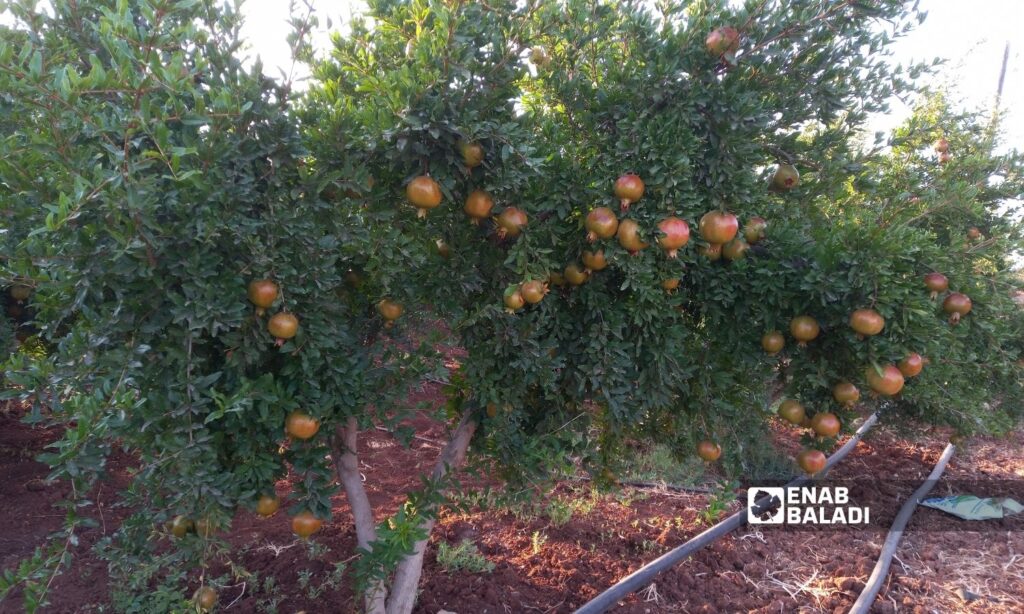Daraa – Halim Muhammad
Fearing that wild boars will enter their fields, a number of farmers in the western countryside of Daraa spend hours of their nights protecting their crops amidst the noise of drumming, whistling, and gunfire.
Farmers continue to suffer in the areas surrounding the Yarmouk Valley, in the west of the southern governorate, as a result of their crops being damaged as a result of the entry of wild boars into their lands.
Wild boars choose the valley terrain to hide among the woods by day, destroy crops and trees, and eat fruits at night.
The Yarmouk Valley separates large agricultural areas, including the villages of the Yarmouk Basin in the north, al-Ash’ari, al-Ajami, Zayzoun, and Tal Shihab in the south.
These are areas where agriculture is the main source of income and crops vary according to the seasons.
Guarding in summer, postponing planting to winter
With a stick and a lamp in hand, Mohammed, 35, spends an entire night checking his crop, fearing the arrival of a herd of wild boars.
Mohammed told Enab Baladi, “I do not guard my field for fear of thieves, but rather from the pig that eats fruits and destroys trees, and I keep guarding every night until the crop is sold. A herd of pigs may eat a ton of pomegranates in one night, which affects the crop size at harvest time.”
The farmer, who owns ten dunums (9000 m2) of pomegranate cultivation, added that large herds emerge from the valleys, estimated at 100 boars per herd, and spread in the plains surrounding the valley to a depth of more than five kilometers.
The farmer, Nabil, 40, said that the damage caused by wild boars is not limited to fruit trees but rather to vegetable crops such as corn, lettuce, peas, and beans, and other crops such as wheat, barley, and chickpeas.
Guarding the vegetable fields begins with their cultivation, as the pig initially searches for seeds and worms after planting, and after its maturity, it eats vegetables and destroys the seedlings, Nabil added to Enab Baladi.
The night watch is more stressful for farmers, so Nabil decided to cancel the idea of planting winter vegetables, which is an important activity for farmers in the areas surrounding the Yarmouk Valley, and a number of farmers in the area are thinking the same way, he added.
Paid guard or “expensive” fence
Daraa farmers have resorted to solutions, some of which were temporary, such as night guards, and some of them ended the problem completely but were expensive options, such as building a fence surrounding the agricultural land.
Raed, 40, a farmer who owns 15 dunums (13,500 m2) planted with pomegranate, and ten dunums (9000 m2) planted with olives, told Enab Baladi that he was forced to hire a guard for a daily or monthly wage that could reach up to 300,000 SYP (about 75 USD), for a temporary period that lasts until harvesting the crops, for fear from the entry of wild boars into his territory.
Raed added that these amounts that he pays increase the cost of production, but they guarantee him the protection of the crop from destruction and damage.
Some farmers in the area may also use dogs in the vicinity of crops because they bark when wild boars enter the field.
Another solution is to build a wall around the agricultural lands, but it is an expensive option, according to Raed, as fencing ten dunums costs about 8 million SYP (about 2000 USD).
Government does not act, solutions are individual
A number of farmers interviewed by Enab Baladi affirmed that the government is not making tangible efforts to curb the spread of pigs, leaving the burden on farmers.
Jamil al-Abdullah, the head of the Forestry Department in the Directorate of Agriculture in Daraa, said in May that Daraa governorate is characterized by biodiversity and has animal and plant diversity, some of which are local and some that are adapted to the prevailing conditions, and the most important animal species are locusts, wild boars, owls, hyenas, deer, and wolves.
An agricultural engineer in the western countryside of Daraa (Enab Baladi withheld his name for security reasons) says the double-hoofed mammal prefers wet areas such as the Yarmouk Valley and breeds in large numbers.
The wild boar resorts to agricultural crops in search of food after the lack of pasture at the bottom of the valley, and it causes damage to the entire crop surrounding the Yarmouk Valley, but the huge impact is on vegetables because they are less resistant than trees. The boars eat fruits during their ripening period.
According to the engineer, the most useful solutions to confront boars are good fencing, or night watch, explaining that pigs are animals that flee when they see or feel humans, which is one of the ways farmers use such as making noise or using hunting rifles.
Wild boars are not considered threatening animals to humans except when they are surrounded, a condition in which the pig feels the need to defend itself, the engineer concluded.

